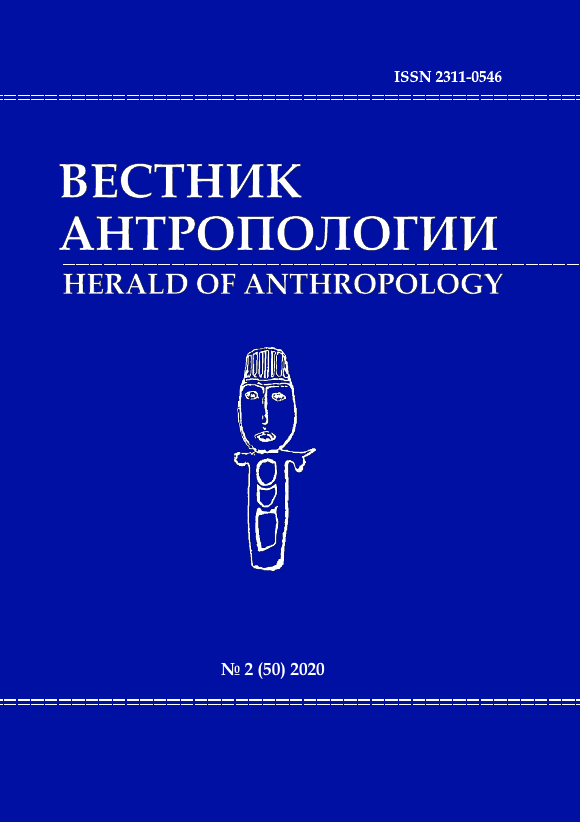Identity of the Young People on the Borderland of Belarus and Russia
DOI: 10.33876/2311-0546/2020-50-2/225-240
Keywords:
Belarusian-Russian borderland, ethnic identity, identity structure, national identity, state, border.Abstract
This article presents the results of research on various identities (ethnic, national and other) of high school students in the conditions of weak ethno-cultural differentiation of neighboring nations. The study was conducted on both sides of the state border of the Republic of Belarus and the Russian Federation. The sample consisted of 641 students aged 16-18 from 12 secondary schools in the Belarusian borderland and 669 students from 14 secondary schools in the Russian borderland.
As research showed, identification with one’s own ethnic group (in this case, Russians and Belarusians) is mainly based on territorial factor: the state in which the young person was born and (or) lives. These two indicators are the first and the second most frequently chosen arguments when determining one’s ethnic affiliation. The “language” and nationality of parents were also significant, although to a lesser extent.
Research on the structure of young people’s identities has revealed the increasing role of national identity. However, its significance on the Russian border is higher than on the Belarusian border. Based on the obtained research results, it is concluded that in conditions of weak ethno-cultural differentiation, the vector of identity formation is shifted towards national identity. At the same time, the importance of ethnic identity remains.
References
- Belinskaia, E.P., and T.G. Stefanenko. 2008. Etnicheskaia sotsializatsiia podrostka [Ethnic socialization of a teenager]. Moscow: MPSI-Voronezh: MODEK.
- Grigoryeva, R.A., and M.Yu. Martynova (ed.) Belorussko-russkoe pogranich'e. Etnologicheskoe issledovanie' [Belorussian-Russian borderland. Ethnological research]. Moscow: RUDN.
- Volkogonova, O.D., and I.V. Tatarenko. 2001. Etnicheskaia identifikatsiia russkikh, ili Iskushenie natsionalizmom [The ethnic identification of Russians, or the Temptation of nationalism]. Mir Rossii: sbornik nauchnykh trudov [World of Russia: collection of scientific papers]. Vol. 2. Moscow.
- Drobizheva, L.M. (project manager and ed.). 2013. Grazhdanskaia, etnicheskaia i regional'naia identichnost': vchera, segodnia, zavtra [Civil, ethnic and regional identity: yesterday, today, tomorrow]. Moscow: Rossiiskaia politicheskaia entsiklopediia.
- Davydov, O.B. 2011. Stanovlenie rossiiskoi identichnosti i problematizatsiia etogo iavleniia v sotsial'nom kontekste [The Formation of Russian Identity and the Problematization of this Phenomenon in a Social Context]. Vlast' i upravlenie na Vostoke Rossii
- Drobizheva, L.M, A.R. Aklaev, V.V. Koroteeva, and G.U. Soldatova 1996. Demokratizatsiia mi obrazy natsionalizma v Rossiiskoi Federatsii [Democratization and the images of nationalism in the Russian Federation]. Moscow.
- Drobizheva, L.M., and S.V. Ryzhova. 2015. “Grazhdanskaia i etnicheskaia identichnost” i obraz zhelaemogo gosudarstva [Civil and ethnic identity and the image of the desired state]. Politicheskie issledovaniia 5.
- Voronkova V., and I. Osval'd (eds.). 1998. Konstruirovanie identichnosti. Etnicheskie obshchiny Sankt-Peterburga [The construction of identity. Ethnic communities of St. Petersburg]. SPb: Dmitrii Bulanin.
- Mishina, M.M. 2015. Psikhologo-pedagogicheskie tekhnologii razvitiia intellektual'noi deiatel'nosti lichnosti [Psychological and pedagogical technologies for the development of intellectual activity of a person] Vestnik MGOU
- Naumenko, L.I. 2005. Belorusskaia identichnost': kul'turnaia i etnicheskaia sostavliaiushchie [Belorussian identity: cultural and ethnic components]. Etnopsikhologicheskie i sotsiokul'-turnye protsessy v sovremennom obshchestve [Ethnopsychological and sociocultural processes in modern society]. Balashov.
- Semenenko, I.S. (ed.). 2012. Politicheskaia identichnost' i politika identichnosti [Political identity and identity policy]. Vol. 1. Identichnost' kak kategoriia politicheskoi nauki. Slovar' terminov i poniatii [Identity as a category of political science. Glossary of terms and concepts]. Moscow.
- Snezhkova, I.K. 1998. K probleme izucheniia etnicheskogo samosoznaniiau detei i iunoshestva: po materialam g. Kieva i Zakarpatskoi oblasti [On the problem of studying ethnic identity in children and youth: based on materials from Kiev and the Transcarpathian region]. Sovetskaia etnografiia
- Snezhkova I.A. 2004. Formirovanie etnicheskikh prestavlenii ukrainskikh i russkikh shkol'nikov [Formation of Ethnic Representations of Ukrainian and Russian Schoolchildren]. Sotsiologicheskie issledovaniia 11: 83–89.
- Snezhkova, I.A. 2003. Etnicheskie aspekty gendernogo sotsial'nogo neravenstva [Ethnic Aspects of Gender Social Inequality]. Sotsiologicheskie issledovaniia
- Stefanenko, T.G. 2006. Etnopsikhologiia: praktikum: Uchebnoe posobie dlia studentov vuzov [Ethnopsychology: Workshop: Textbook for university students]. Moscow: Aspekt Press.
- Khotinets V.Iu., E.A. Molchanova. 2014. Oposreduiushchaia rol' etnicheskogo obraza v mezhetnicheskikh otnosheniiakh [The mediating role of the ethnic image in interethnic relations]. Psikhologicheskii zhurnal 35: 3.
- Erikson, E. 1996. Identichnost'; iunost' i krizis [Identity: Youth and Crisis]. Moscow.
- Grigorieva, R.A., Romanenko, I.V., Kryukova, S.S. et al. (ed.). 2018. Etnokul'turnyyi landshaft belorussko-rossiiskogo pogranich'ia v nachale XXI veka (po materialam polevykh issledovanii v sel'skoi mestnosti' [Ethnocultural landscape of the Belarusian-Russian borderland at the beginning of the XXI century (based on field research in rural areas]. Moscow.
- Phinney J.S. and Rotheram M.J. Children’s Ethnic Socialization: Pluralism and Development. Sage Publications, 1987.





















